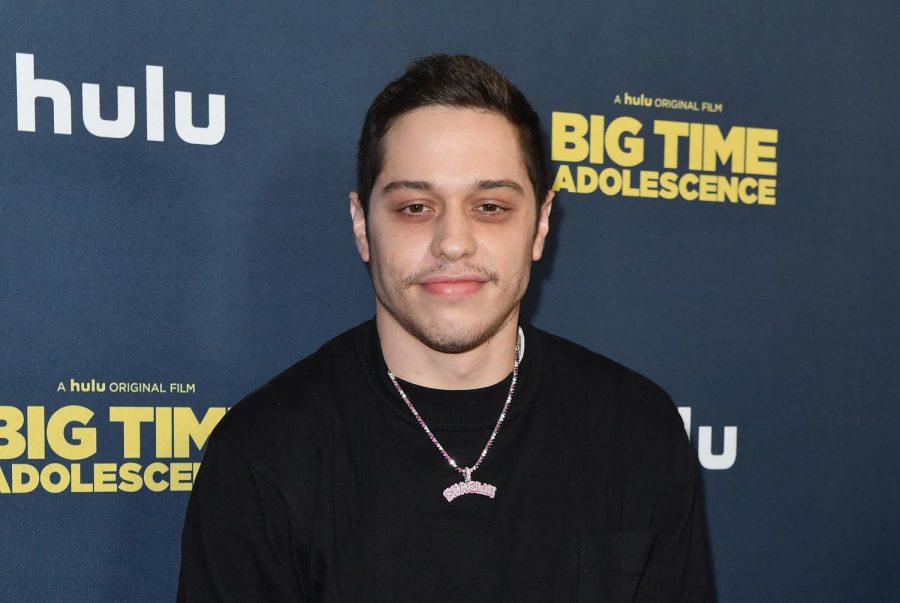Opinion | Pete Davidson is more than ‘ugly hot’
Photo courtesy of Angela Weiss/Getty Images/TNS
Comedian Pete Davidson attends the premiere of Hulu’s “Big Time Adolescence” in New York on Mar. 5, 2020. Senior columnist Eddie Ryan argues that Davidson’s charism and personality is being overlooked by his appearance in media.
Mar 1, 2022
Some time ago, I came across a rather amusing junk headline. It stuck with me: “Is Pete Davidson ugly hot enough to be the next Steve Buscemi?”
Ouch. It occurred to me that this oxymoron might be the supreme backhanded compliment. It’s also surprisingly informative when it comes to understanding how looks are judged and categorized.
One of my initial reactions to reading the jab was of bemused insecurity. I, for one, consider both Davidson and Buscemi to be good-looking men; if they’re relegated to second-class sex appeal, then what hope do I have?
Kidding aside, the comparison between these two is remarkably intuitive. Buscemi’s distinctive features are a big source of comedy in “Fargo,” where he is repeatedly established as “funny lookin’… in a general kind of way.” And Davidson’s seem to function similarly, with an appealing blend of quirk and charm.
It took a bit longer for me to peel back the layers on my new favorite term, but when I did, it all made sense. In his film “Big Time Adolescence,” Davidson’s character actually used the phrase on himself — in comparison to Buscemi no less. When a friend tells him he’s too ugly to act, Davidson’s character Zeke quips — with admirable resilience — “but like ugly hot, like Steve Buscemi.”
Get The Daily Illini in your inbox!
This joke may have deeper cultural significance beyond Staten Island-style self-deprecation. After all, Davidson’s attractiveness or lack thereof has been the subject of great attention since before his relationship with Kim Kardashian. Davidson’s imposing dating streak has brought the notion of ugly hotness to the cultural fore.
I once viewed the Saturday Night Live comedian as a somewhat inspiring figure in this regard, joking to myself and others that his prowess gave hope to the legions of similarly equipped adolescent-looking young men wandering about in confusion. I no longer cling to this association; Davidson’s clearly in a class of his own.
But it also bears mentioning that looks aren’t the only reason behind the Pete Davidson phenomenon. The tendency to fixate on them is part of the issue that needs addressing.
My biggest takeaway from Davidson’s relationships is, if accurate, pretty telling. It seems that while men often don’t understand his success, women are less surprised. Maybe they’re more likely to appreciate the value of his charm, humor and kind demeanor, whereas some men can’t get past the fact that he isn’t Channing Tatum. Not to mention what might be his most valuable asset, at least according to Emily Ratajkowski, his great relationship with his mother.
This disconnect underlies discussions of appearance, which are of course highly gendered. The focus on Davidson’s looks highlights a familiar cultural tendency to overemphasize the importance of looks in general, an emphasis which comes down harder on women.
That’s the flip side of the debate over Davidson’s hotness. In this case, our collective obsession with appearance comes at the expense of Pete, the skinny young man dating models. However, most of the time that obsession manifests itself in shallow and degrading pressures on women young and old.
This idea grows clearer when one considers the disparate societal attitudes toward older men and women. Many a man, usually one with cash to spare, has earned the label “silver fox” in his old age and put it to use in the pursuit of younger women. Older women hardly enjoy any of this cachet, except as “cougars”— a term with less flattering connotations.
As glib and unoriginal as it sounds, it wouldn’t hurt to lessen our collective emphasis on looks a bit. It could help narrow the chasm of misunderstanding among different genders, long a thorn in the side of human relations.
Seinfeld captures this social phenomenon quite well, as usual. When Elaine discovers she isn’t in Jerry and George’s pilot script for NBC, they’re laughably forced to admit that they couldn’t write for a woman — they have positively no idea what she might say or do.
Davidson himself likely doesn’t have time to reflect on these weighty matters. At present, he is locked in a civil war that appears about as intractable as the Ukraine conflict. Upset over his divorce from Kim Kardashian, Kanye West has adopted a hostile if hilarious stance toward Davidson online.
Here’s hoping that blows over before West, understandably distraught, does something to jeopardize his ability to see his kids. In the meantime, everyone involved could benefit from less time in the spotlight.
I’ve thus arrived at the crux of the pop-culture paradox I set out to confront: To criticize excessive media coverage of celebrities, one has to enter — and risk legitimizing — the circus. Now that I’ve had my say, let’s give the subject of Pete Davidson’s looks a rest.
Eddie is a junior in LAS.






